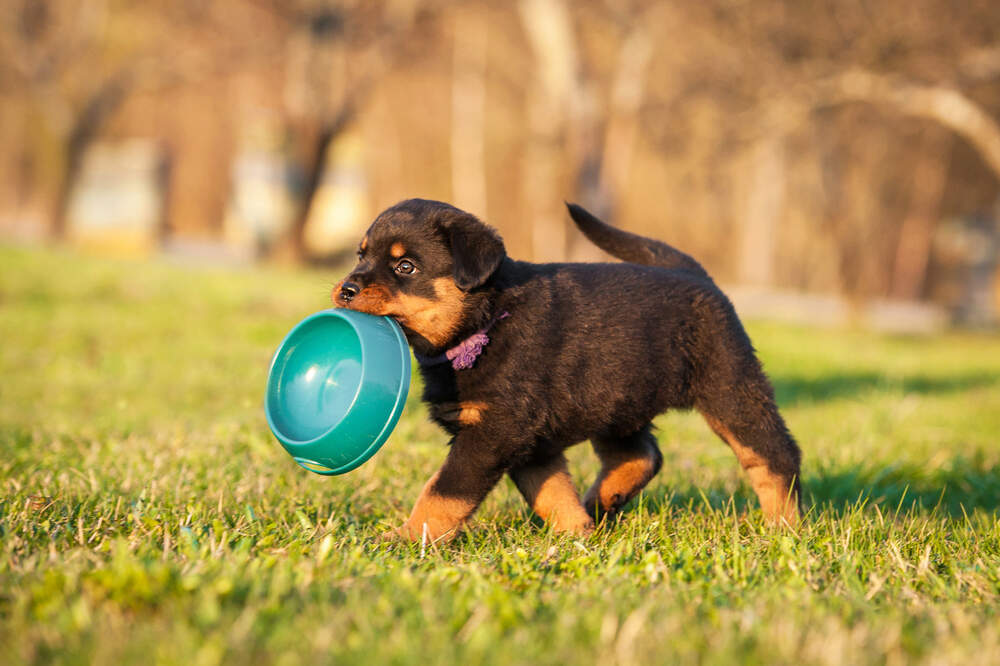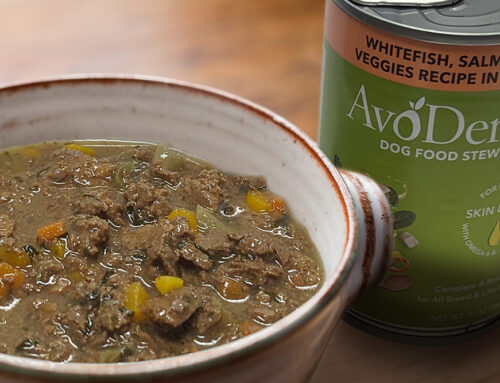Raising a puppy can be so much fun. Your cute, little fur baby is all over the place playing, wagging his tail, and bringing joy to your home. But as he grows, you eventually find yourself wondering how long your puppy should keep eating puppy food. Depending on your dog’s breed and size, you typically want to switch from puppy food to dog food sometime between seven and 14 months of age, although there are outliers.
Puppy Food Has Nutrients Growing Dogs Need
Puppy food has a lot of extra nutrients and protein that adult dog food may lack.1 A growing dog that’s building muscle and bone needs more nutrients and calories to maintain healthy development. Puppies, especially those of a larger breed, need the right amount of fatty acids, fiber, and protein, along with controlled amounts of calcium so bones grow at the proper rate. They also need certain omega-3 fatty acids for proper development.2 This is why puppies need food formulated for their nutritional needs, rather than adult dog food.
AvoDerm Natural dog food offers two formulas created especially for puppies. The canned Puppy Chicken & Rice Formula has chicken as the first ingredient to help any puppies with food sensitivities to other proteins. It’s also made with avocado, which is rich in antioxidants that can help promote a healthy immune system.
If you prefer dry kibble, AvoDerm Natural dog food offers a Puppy Chicken Meal & Brown Rice Formula. This has just the right balance of protein, fat, and nutrients that puppies need. It’s also corn- and wheat-free, which is great for puppies with more sensitive stomachs.
When to Make the Switch
Depending on your puppy’s breed and size, you’ll likely switch to adult dog food between seven and 14 months.3 Puppies need the most food when they are around six- to 12-weeks-old. At this stage, you will need to feed them three times a day. As your puppy gets older, you’ll gradually reduce the feeding to twice a day.
Small breed puppies may be ready to switch to adult food around seven to nine months of age, while larger breeds may not make the switch until they’re between 12 and 14 months old.4 In general, it’s better to make the switch a little too late rather than too early.
Talk to your veterinarian about when you should switch your pup to adult food since the exact timing will depend on your puppy’s breed, size, and health. Sometimes it can take longer than 14 months if your puppy is still growing.Some dogs even take up to 24 months to reach their full size.5
When making the switch to adult dog food, consider a nutritious and flavorful variety like AvoDerm Natural Lamb & Sweet Potato recipe for dry kibble. If your pup prefers wet food, try the AvoDerm Natural Original Wet Canned Food Beef & Potato Stew Recipe.
If you’re worried about transitioning your puppy to adult dog food, consider moving to an all-life-stages variety of dog food first. (You may need to adjust the feeding guidelines on the package. When in doubt, talk with your vet!) All-life-stage varieties, like AvoDerm Natural Salmon & Vegetables Recipe, are suitable for puppies and can be a great way to help your puppy make the transition to adult dog food.
Raising a puppy is so much fun. While you’re playing and having adventures together, make sure he’s enjoying nutritious food designed especially for his age. At the right time, your vet can help you figure out the best time to switch from puppy food to dog food.
1. Lewis, Betty. “How Much Protein & Fat Does a Puppy Need?” Dog Care Daily, https://dogcare.dailypuppy.com/much-protein-fat-puppy-need-4348.html.
2. Williams, Krista. “Raising Puppies.” VCA Hospitals, 2019, https://vcahospitals.com/know-your-pet/puppy-raising.
3. Mansourian, Erika. “Puppy Feeding Fundamentals.” AKC, 15 July 2019, https://www.akc.org/expert-advice/health/puppy-feeding-fundamentals/.
4. Ibid.
5. Paretts, Susan. “When does my puppy finish growing?” AKC, 16 August 2019, https://www.petmd.com/dog/centers/nutrition/when-should-you-switch-from-puppy-to-adult-dog-food.
5. Mansourian, Erika, https://www.akc.org/expert-advice/health/puppy-feeding-fundamentals/.





